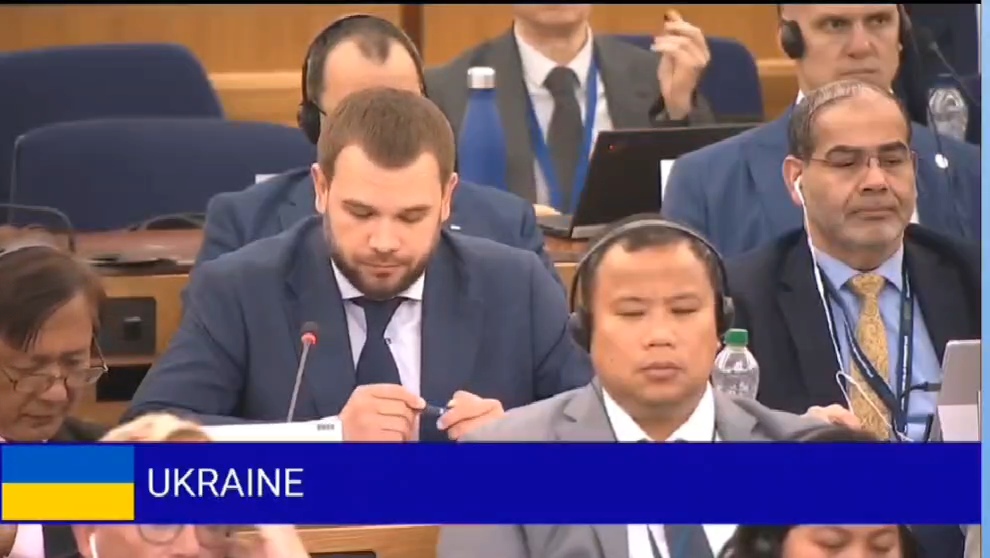(19 June 2025, 15:00 GMT, London,
United Kingdom of Great Britain and Northern Ireland)
Thank you, Chair.
On behalf of the Ukrainian delegation, I wish to express our profound gratitude to the IMO Secretariat — not only for the submission of document MSC 110-slash-8 but for its unwavering commitment to enhancing maritime security worldwide.
While there are many facets to ensuring the sustainability of seaborne trade, let us be clear: security is the alpha and omega of all comprehensive IMO action. Whether we are discussing marine environment protection, traffic facilitation, ship construction safety, or seafarers’ training, none of these objectives can be realized in the absence of good order at sea. When systematic, unlawful armed interference with shipping prevails, and when there is no genuine respect for the lives and health of maritime workers, regulations and standards become unenforceable.
Regrettably, some member states continue to flout these fundamental principles. Chair, this is now the eighteenth session of the MSC 1 since the russian federation’s illegal occupation and attempted annexation of the Crimean Peninsula. Since 2014, russia’s actions in the Black Sea and the Sea of Azov have been designed to turn the region into a grey zone for international maritime law – an area of heightened danger for shipping and for all who depend on it.
The aggression began with the seizure of Ukrainian offshore drilling platforms and government vessels, in blatant violation of the Suppression of Unlawful Acts Convention and its Protocol. Security plans for Ukrainian port facilities were breached, forcing the Ukrainian Government to officially cease operations and declare ports closed indefinitely.
Since the full-scale invasion of February 2022, the russian federation has abandoned even the pretense of upholding maritime security. As highlighted in resolution A.1183(33) 2, russia has adopted essentially terrorist tactics – targeting Ukrainian port infrastructure and foreign-flagged ships calling at our ports. Unable to enforce a full naval blockade, russia has sought instead to intimidate and disrupt the special maritime corridor through random, indiscriminate strikes. These attacks, carried out with cruise and ballistic missiles and unmanned aerial combat vehicles, have escalated dramatically, most notably last autumn and this spring.
Less than a month ago, on 23 May, a Ukrainian port worker lost his life during routine container handling, once again due to an Iskander ballistic missile. Such reckless and inhumane actions perpetuate the crisis of stranded ships. Both the 35th Extraordinary Council session and 105th session of this Committee in early 2022 demanded that the stranded vessels be safely evacuated together with seafarers. Yet, dozens of vessels remain trapped in Ukrainian ports, particularly Mykolaiv and Kherson, as a direct result of russian hostilities.
Chair, I must reiterate: the russian federation is shedding the blood of innocent seafarers and port workers in pursuit of its malign political ambitions, with utter disregard for the underpinning principles of the IMO. The hypocrisy is stark: by attacking Ukrainian ports, russia has also violated UN Security Council resolution 2341 on the protection of critical infrastructure from terrorist attacks – a resolution it itself supported in 2017, and which was sponsored by Ukraine to explicitly recognize the critical status of maritime transport facilities.
Earlier this year, the IMO Secretary-General visited Ukraine, witnessing firsthand the devastating impact of russia’s aggression on our ports, our seafarers, and our maritime infrastructure. His visit brought global attention to the very real dangers faced daily by Ukrainians.
The Ukrainian delegation strongly believes that a substantial review of maritime security regulations is urgently needed. Just as the ISPS Code was introduced in response to the 9/11 terrorist attacks, we must now respond resolutely to the brutal misconduct of the Russian Federation and to breaches of freedom of navigation in the Red Sea. In this regard, we reserve the right to submit proposals on the relevant issue for consideration at the next MSC meeting.
Still, just as Ukrainian ports are attacked from the sea, Ukrainian cities are bombarded from the sky. In recent weeks, the russian federation has resorted to outright terror against the civilian population of Ukraine. Women and children are being killed in their homes. The most horrifying recent case occurred on 17 June 2025, when a massive missile attack on Kyiv took the lives of 28 civilians and injured 140 more. A permanent member of the UN Security Council is using its arsenal to butcher civilians and devastate urban life. It is a deliberate campaign to instil fear and suffering in Ukraine and beyond. This is their way of establishing ceasefire, this is how they understand peace.
Our collective action must safeguard the lives and health of maritime workers, strengthen the resilience of critical supply chains, and contribute to a just, lasting, and comprehensive peace in Ukraine.
We respectfully request that this statement be reflected in the final report of the 110th session of the MSC Committee and appended in its annex.
Thank you.
